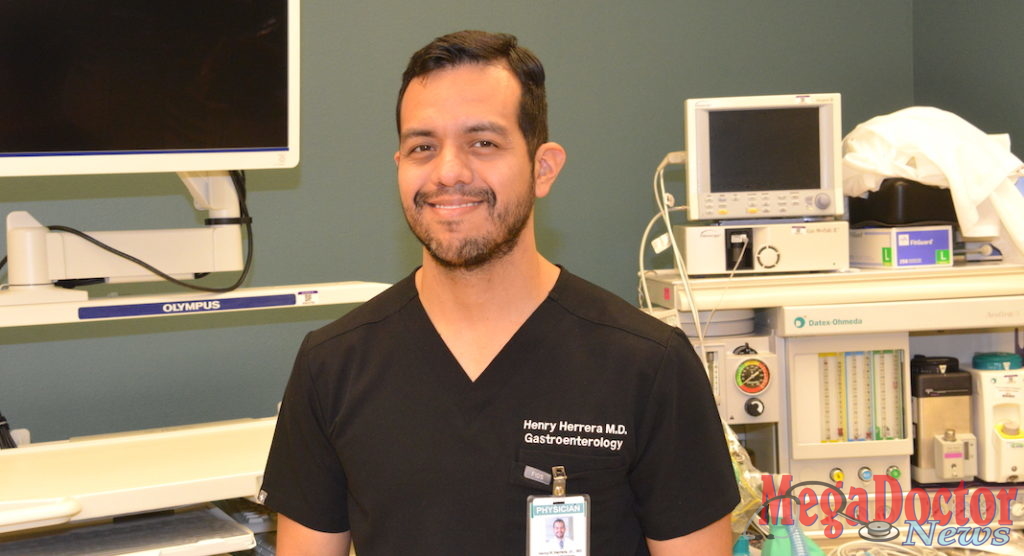
By Roberto Hugo Gonzalez
As originally published in Mega Doctor NEWS newsprint edition May 2020.
Dr. Henry R. Herrera Jr., MD is a Gastroenterology specialist with The DHR Health Gastroenterology Institute in Edinburg, Texas. Dr. Herrera is part of the medical physicians that responded to Mega Doctor NEWS invitation to tell us their concerns about COVID-19.
He was eloquent to say that there is an endless list of concerns regarding COVID-19, as evidenced by what’s already occurred in hotspots like China, parts of Europe, and, worst of all, right here in the United States.
“I think that when you look at the sheer number of deaths that have occurred in the United States alone, the fact that we have gone from our first confirmed death on February 29th to 33,000 deaths in just seven weeks should be incredibly frightening,” he told Mega Doctor NEWS.
He pointed out that the U.S. government has estimated that there will be between 100,000-200,000 deaths from this pandemic.
“To put this into perspective, there were 2,977 deaths during the September 11th terrorist attacks, 58,220 American deaths during the Vietnam War, and 116,516 American deaths during World War 1.” He continued, “One of my greatest concerns about COVID-19 is the fact that, despite the massive death toll, there are still many Americans and members of the government that are not taking this seriously and are expecting it just to blow over.”
Also, he said that the pandemic has drastically affected the clinic where he works. “Normally, I physically see anywhere between 15-25 clinic patients and perform 15-20 endoscopic procedures per day.”
During this period, he told, this has changed. “Because to protect both patients and healthcare staff, I have postponed all elective procedures as per the recommendations by the major GI societies and have converted my practice to an almost exclusively telemedicine platform.”
Dr. Herrera also said that DHR Health Gastroenterology Institute is currently performing COVID-19 screening on every person entering an inpatient or outpatient building, including a temperature check and a series of screening questions to assess exposure risk. “Even for those who pass screening, I believe it will be important to continue to encourage mask use within the clinic and within endoscopy to prevent spread from asymptomatic individuals.”
He said that asymptomatic and immune are two very different concepts. “You can have an active infection, not yet have acquired immunity, be asymptomatic, and still infect someone else. That is why this particular virus so dangerous.”
He explained that the concept of immunity describes when your body has mounted a fighting response to an infection with a cell called a lymphocyte. Lymphocytes produce antibodies, which are a sort of memory to prior infection, which allows your body to fight it much more efficiently if it becomes exposed a second time.
He adds that the problem with that immunity is not perfect, and it can wane with time. He said, “This is the reason we have vaccines, or boosters, to keep our immunity strong.” He continued, “Since this virus is so new, scientists still don’t know whether people who recover from COVID-19 are immune.
Dr. Herrera thinks that our actions will help us leave quarantine. He emphasizes that social distancing measures are essential. Like, proper handwashing techniques, avoidance of large crowds, a six-foot distancing between each other, mask use, and following the shelter-in-place guidelines are all much more powerful tools than relying on an antibody test.
He pointed out that people who are at the highest risk for severe disease, as per the CDC, include adults over the age of 65, people living in a nursing home, and people of all ages with certain chronic medical conditions. These conditions include COPD, end-stage kidney disease on dialysis, diabetes, severe heart conditions, severe obesity, chronic liver disease, and immunosuppression.
“As a GI doctor, one group of patients we have who are often immunosuppressed are those with inflammatory bowel disease who are taking high dose steroids for management,” he finalized.
Dr. Henry R. Herrera Jr., MD is a Gastroenterology specialist at the DHR Health Gastroenterology Institute in Edinburg, Texas.









